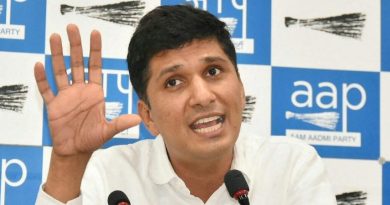| |
|---|
News Desk: The Bombay High Court on Monday rejected Arnab Goswami’s plea for interim bail. The bench of Justices S.S Shinde and Justice M.S Karnik held that “no case had been made out for grant of extraordinary relief”, and that Goswami had alternative routes to secure bail, which is what he should advert to.

The judges clarified that these observations should have no impact on Goswami’s plea for bail under Section 439 of the Code of Criminal Procedure, that has been filed with the local sessions court.
The high court on Saturday had held that the sessions court should decide his bail plea within four days of it being filed. This was reiterated in their order on Monday.
Goswami, who had been sent to judicial custody of 14 days after the arrest, had originally been lodged at a quarantine centre of Alibaug municipal school. However, he was moved to Taloja Jail in Navi Mumbai on Sunday, 8 November.
According to investigating officer Jamil Shaikh of the Raigad crime branch, Goswami was using somebody’s mobile phone and was active on social media while being in judicial custody.
Goswami had filed two petitions in the Bombay High Court after his arrest on Wednesday last week: a habeas corpus plea arguing his arrest was illegal, and a plea to quash the FIR against him.
His lawyers, senior advocates Abad Ponda and Harish Salve, made detailed submissions to argue that Goswami’s arrest was “illegal”, citing comments made by the magistrate who had sent him to judicial custody (while rejecting the police’s request for police custody).
Salve also argued that this was part of a wider “pattern” of attempts to silence Goswami by the Maharashtra government, citing the numerous FIRs and cases against him for various issues, including his coverage of the Palghar lynching, the fake TRP case, and the Maharashtra Assembly’s breach of privilege motion.
During the hearings on Thursday, Friday and Saturday, the court had questioned why the high court should consider the bail plea at this time, since the option of regular bail under Section 439 CrPC before the sessions court had not been exhausted by Goswami.
The court had also observed that making a decision on this case would undermine the authorities of lower courts, reported Bar and Bench, especially since the magistrate’s remand order being cited by Goswami’s lawyers here had been challenged by the Maharashtra authorities in a revision application.




